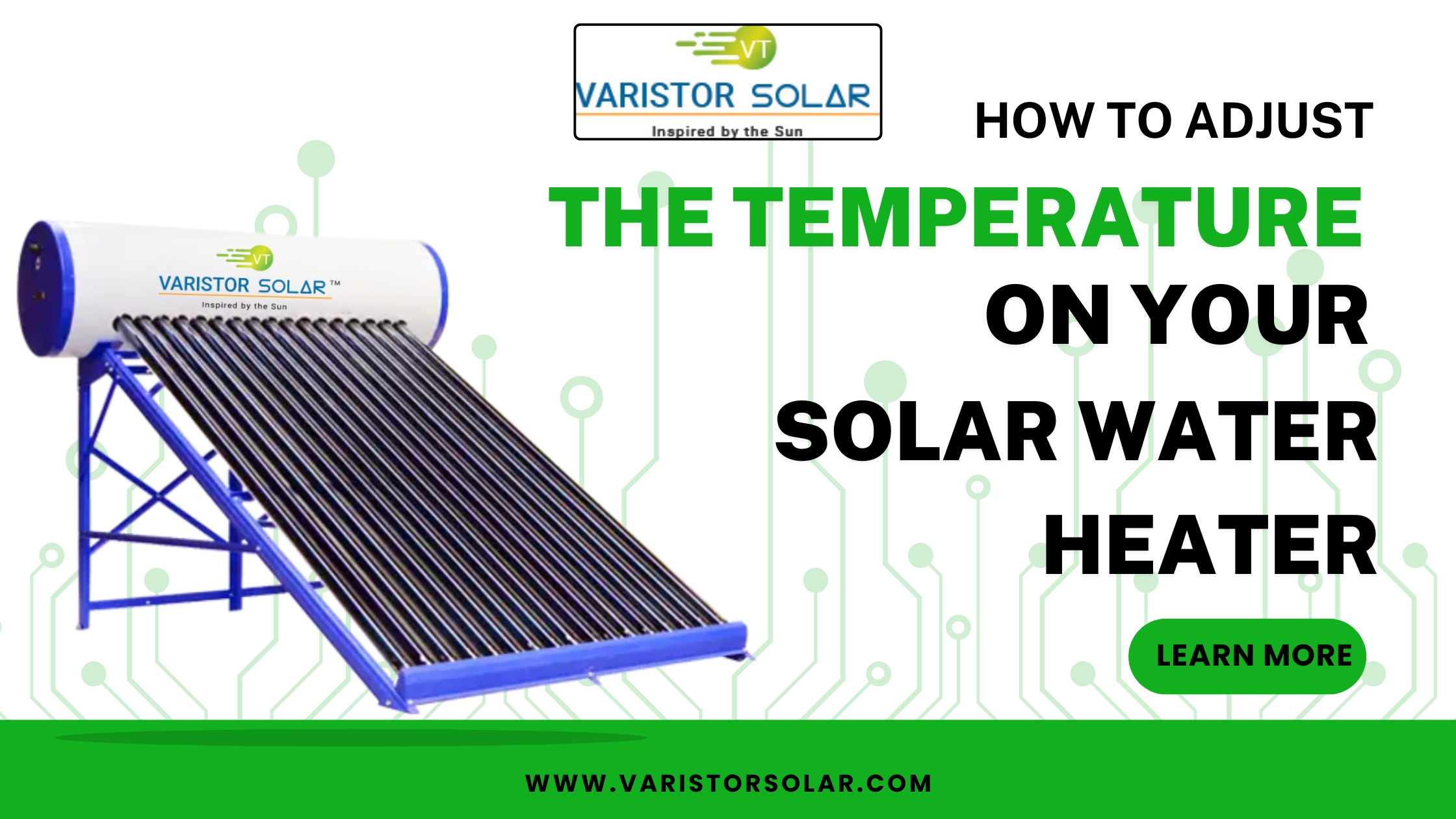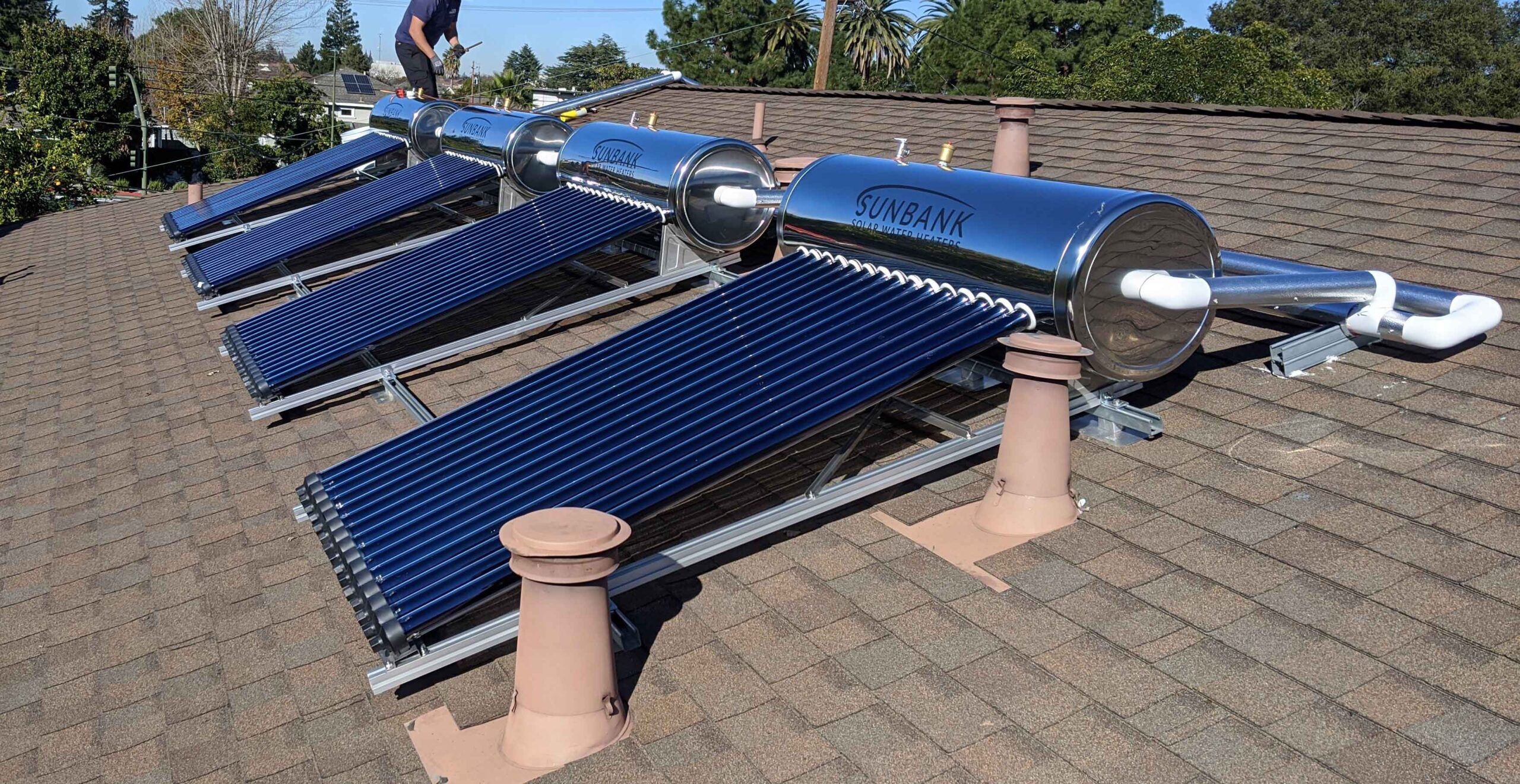Imagine a world where your morning showers are powered by the sun. The idea of using solar energy to heat water is not just eco-friendly; it’s incredibly efficient.
But here’s the burning question: how hot can a solar water heater actually get? If you’ve ever wondered about the capabilities of these innovative systems, you’re in the right place. By the end of this article, you’ll discover the impressive heating potential of solar water heaters and how it can benefit your daily life.
You’ll also learn some tips on maximizing the temperature and efficiency of your system. So, stay with us as we unveil the science and secrets behind solar water heating that could revolutionize how you think about energy and comfort in your home.

Credit: www.varistorsolar.com
Page Contents
Solar Water Heater Basics
Solar water heaters can heat water up to 180°F, depending on sunlight and system efficiency. These devices use solar panels to absorb and convert sunlight into heat. Optimal placement and maintenance ensure maximum temperature.
Understanding how hot a solar water heater can get begins with grasping the basics of how these systems function. Solar water heaters use the sun’s energy to heat water, providing an eco-friendly and cost-effective solution for your household. Whether you’re new to this technology or considering upgrading your current setup, knowing the essentials will help you make informed decisions.Components And Functionality
Solar water heaters typically consist of three main components: solar collectors, a storage tank, and a circulation system. The solar collectors, usually positioned on your roof, absorb sunlight and convert it into heat. This heat is then transferred to the water in the storage tank through a circulation system. Think of the solar collector as the heart of the system. It’s where the magic happens. The collector captures sunlight, which is then transformed into heat energy. This process can heat water to temperatures ranging from 60°C to 80°C, depending on sunlight exposure and system efficiency.Types Of Solar Water Heaters
There are primarily two types of solar water heaters: active and passive systems. Active systems use pumps and controls to circulate water, while passive systems rely on natural convection. Active systems are often more efficient but can be more complex and costly. Passive systems, on the other hand, are simpler and more durable. They’re ideal if you live in a warm climate and want a low-maintenance option. Imagine having a system that just works, quietly and efficiently, heating your water without you lifting a finger. Which type fits your lifestyle better? Choosing between these types depends on your budget, climate, and personal preferences. Think about your daily hot water needs. Which system aligns with your goals of efficiency and sustainability? By understanding these basics, you’ll be better equipped to harness the power of the sun. Solar water heaters not only save you money but also reduce your carbon footprint. Are you ready to make a change that benefits both your wallet and the planet?Factors Influencing Temperature
Understanding how hot a solar water heater can get involves several factors. The temperature can vary based on different elements. Each element plays a crucial role in the system’s efficiency. Let’s explore these factors in detail.
Climate And Weather Conditions
Solar water heaters depend heavily on the sun. Sunny climates often produce higher water temperatures. Cloudy or rainy days reduce efficiency. Seasonal changes also impact water heater performance. In winter, temperatures may be lower.
System Design And Materials
The design of the system matters a lot. Well-designed systems retain heat better. Quality materials enhance efficiency and durability. Insulation is crucial for heat retention. Poor insulation leads to heat loss. Better materials mean hotter water.
Collector Size And Orientation
Collector size impacts heat absorption. Larger collectors absorb more sunlight. More sunlight means higher water temperatures. Orientation also affects performance. Collectors should face the sun directly. Proper alignment maximizes heat capture.
Maximizing Efficiency
Maximizing the efficiency of a solar water heater is crucial. It ensures you get the most heat possible. With the right setup, your solar water heater can reach high temperatures. It is essential to focus on certain practices. These include installation, maintenance, and advanced technology.
Optimal Installation Practices
Correct positioning of solar panels is vital. Panels should face the sun directly. This maximizes sunlight absorption. Ensure no shadows block the panels. Shadows reduce efficiency. Install panels at the right angle. The angle should match your location’s latitude. This helps capture sunlight year-round.
Regular Maintenance Tips
Regular cleaning of panels is necessary. Dirt and debris block sunlight. They reduce the heater’s efficiency. Inspect for leaks often. Leaks lower performance. Check all connections. Loose connections can cause problems. Ensure the system is free from obstructions. Clear pathways for water flow are critical.
Advanced Technologies For Efficiency
Consider using heat exchangers. They improve heat transfer. Use efficient pumps for better circulation. Smart controllers can optimize performance. They adjust settings based on weather. Sensors monitor temperatures and adjust accordingly. Advanced insulation reduces heat loss. It keeps the water hotter for longer.
Safety Considerations
Solar water heaters are efficient and eco-friendly. But they can get very hot. Ensuring safety is essential. High temperatures can pose risks. Proper safety measures can prevent accidents. Let’s explore how to keep your solar water heater safe.
Preventing Overheating
Overheating is a common issue with solar heaters. It can damage components. Use a temperature control system. This helps regulate heat. Avoid placing the heater in direct sun all day. Partial shade can help reduce excessive heat. Regular maintenance is key. Clean panels and check for faults. This keeps the system running smoothly.
Protective Measures And Insulation
Insulation plays a vital role. It prevents heat loss and ensures safety. Use high-quality insulation materials. Insulate pipes and tanks effectively. This helps maintain desired temperatures. Install pressure relief valves. They release excess pressure safely. Safety valves are crucial for preventing leaks. Insulated covers can protect the system. They shield it from extreme weather. Regular inspections ensure everything works well.
Comparing Solar Water Heaters
Solar water heaters can heat water up to 200°F, depending on the system and weather conditions. Efficient designs and proper installation maximize temperature, providing hot water for various household needs. Different models offer varying heat levels, making it essential to compare features before purchase.
Comparing solar water heaters can be eye-opening, especially if you’re considering making the switch to this eco-friendly solution. It’s essential to know how different models perform and how much they cost versus their efficiency. This understanding helps you make informed decisions that suit your needs and budget.Performance Across Models
Solar water heaters come in various models, each offering different performance levels. The basic thermosiphon systems are simple but effective, using natural circulation to heat water. More advanced models, like active systems with pumps, can increase efficiency, especially in areas with less sunlight. During my vacation in a cloudy region, I noticed our rented house had an active solar water heater that surprisingly provided hot showers every morning. This shows how technology adapts to different climates to ensure you always have hot water. Consider your local climate when choosing a solar water heater. If you live in a place with lots of sun, a simpler model might suffice. In contrast, areas with less sun might benefit from a more sophisticated system.Cost Versus Efficiency
Balancing cost with efficiency can be tricky but crucial. Initial costs for solar water heaters can be high, but they often lead to savings on energy bills in the long run. A friend of mine invested in a high-efficiency model and, within a few years, saw a significant reduction in his electricity bills. The upfront cost was steep, but the efficiency of the system paid off over time. Think about your long-term goals. Are you looking to save on bills over the next decade? Or is a lower initial investment more feasible for you right now? Your decision should reflect your financial situation and future plans. When weighing your options, ask yourself: How much hot water does your household need daily? Can you afford a higher initial cost for better efficiency? These questions can guide you toward the right choice for your home and lifestyle.
Credit: thesunbank.com
Future Trends
Exploring solar water heater capabilities reveals remarkable temperature potentials. Advances in technology allow these systems to heat water to impressive levels. Future designs might achieve even higher temperatures, enhancing efficiency and usability.
As we look towards the future of solar water heating, exciting trends are on the horizon. These advancements promise not only higher efficiency but also smarter integration into our daily lives. Imagine a system that not only heats your water but also predicts your needs and adapts accordingly.Innovative Designs
The future of solar water heaters lies in innovative designs. Compact and efficient models are emerging, making it easier to install them even in limited spaces. Imagine a sleek, modern unit on your roof that’s not just functional but adds to your home’s aesthetic. New materials are enhancing heat absorption and retention. This means hotter water, faster. Consider how much more convenient it would be to have piping hot water ready, even on cloudy days. Some companies are exploring modular systems. You could expand your setup as your needs grow, ensuring optimal performance without a complete overhaul.Integration With Smart Systems
Smart technology is transforming how we interact with our appliances. Solar water heaters are no exception. Integrating your system with smart home devices can offer real-time monitoring and adjustments. Imagine getting a notification on your phone when the water reaches your desired temperature. Or having your system automatically adjust based on weather forecasts. Smart integration can also help you save energy. By learning your habits, your solar heater can operate at peak efficiency, reducing waste and lowering costs. As these trends evolve, consider how they could fit into your life. Would a modular system or smart integration make a difference in your home? These advancements are not just for tech enthusiasts—they’re practical solutions that can make your everyday routine smoother and more efficient.
Credit: wateruseitwisely.com
Frequently Asked Questions
What Temperature Can Solar Water Heaters Reach?
Solar water heaters can typically reach temperatures between 120°F and 180°F. The exact temperature depends on sunlight intensity and system efficiency. Well-designed systems can achieve higher temperatures, providing hot water even on cloudy days. Regular maintenance ensures optimal performance and temperature consistency throughout the year.
How Does Sunlight Affect Heater Temperature?
Sunlight intensity directly affects heater temperature. Strong sunlight increases water temperature rapidly. Cloudy days may lower efficiency, resulting in cooler water. However, advanced systems are designed to maximize heat absorption even in suboptimal conditions. This ensures a reliable supply of hot water all year round.
Can Solar Heaters Boil Water?
Generally, solar water heaters don’t boil water. They heat water to temperatures suitable for domestic use. Boiling requires temperatures above 212°F, which most systems don’t achieve. However, they provide sufficient hot water for showers, cleaning, and other household needs effectively.
Are Solar Heaters Efficient In Winter?
Yes, solar heaters can be efficient in winter. They use advanced technology to capture sunlight effectively. While efficiency may reduce on cloudy days, systems often include backup heating elements. This ensures consistent hot water supply throughout colder months, maintaining household comfort.
Conclusion
Solar water heaters reach impressive temperatures, heating water efficiently. They harness sunlight, delivering warmth without high energy costs. This eco-friendly option proves beneficial for homes and businesses alike. Proper installation ensures optimal performance, maximizing heat output. Maintenance keeps systems running smoothly, guaranteeing long-term benefits.
Choosing solar water heaters supports sustainable living, reducing carbon footprints. Consider local climate and system specifications before installation. Solar energy continues to be a wise choice for heating needs. Enjoy the comfort and savings of solar-heated water. It’s a practical solution for modern households seeking efficient energy use.
